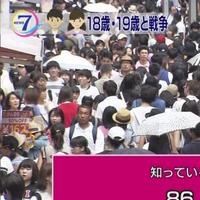18歳 と 19歳 の 14%が 「戦争 が 終わった 日 を 知ら ない」
さい||さい|||せんそう||おわった|ひ||しら|
years|||||war||ended||||
14 % der 18- und 19-Jährigen wissen nicht, wann der Krieg zu Ende war".
14% of 18- and 19-year-olds don't know when the war ended
14% 的 18 歲和 19 歲青少年“不知道戰爭何時結束”
NHK は 6 月 〜7 月 、18 歳 と 19 歳 の 人 に 平和 に ついて どう 考えて いる か 聞き ました 。
nhk||つき|つき|さい||さい||じん||へいわ||||かんがえて|||きき|
NHK||||||||||peace|||||||asked|
Im Juni - Juli, NHK fragte Menschen über 18 Jahre alt und 19 Jahre Frieden über den Frieden.
In June and July, NHK asked people at the ages of 18 and 19 how they thought about peace.
W czerwcu i lipcu NHK zapytał ludzi w wieku 18 i 19 lat, jak myślą o pokoju.
503 人 が 答え ました 。
じん||こたえ|
||answer|
Odpowiedzi udzieliło 503 osób.
8 月 15 日 は 太平洋 戦争 が 終わった 日 です 。
つき|ひ||たいへいよう|せんそう||おわった|ひ|
|||Pacific|war|||day|
August 15th is the day the Pacific War ended.
この 日 を 知って いる か と 聞く と 、「 知って いる 」 と 答えた 人 が 86%、「 知ら ない 」 と 答えた 人 が 14% でした 。
|ひ||しって||||きく||しって|||こたえた|じん||しら|||こたえた|じん||
|||||question marker|||||||answered|||||||||
When asked if they knew about this day, 86% said they did and 14% said they did not.
明治 大学 の 藤井 剛 先生 は 「 中学校 や 高校 の 歴史 の 授業 は 、 太平洋 戦争 を 教える 前 に 終わって しまう こと が 多い ため 、 知ら ない 人 が 増えて いる のだ と 思い ます 。
めいじ|だいがく||ふじい|かたし|せんせい||ちゅうがっこう||こうこう||れきし||じゅぎょう||たいへいよう|せんそう||おしえる|ぜん||おわって||||おおい||しら||じん||ふえて||||おもい|
Meiji|university||Fujii|strong|teacher||||high school||history||class||Pacific Ocean|war||teach|||finished||||often||||||increasing||it is||I think|
Professor Tsuyoshi Fujii of the Meiji University said, "I think that the number of unknown people is increasing because teaching in junior high school and high school history often ends before teaching the Pacific war.
学校 で しっかり 教えて ほしい です 」 と 話して い ます 。
がっこう|||おしえて||||はなして||
school||properly|taught||||||
I want them to be taught properly at school."
いま 日本 が 平和 だ と 思う か と 聞く と 、「 思う 」 が 74%、「 思わ ない 」 が 25% でした 。
|にっぽん||へいわ|||おもう|||きく||おもう||おもわ|||
|||peace||||||||||do not think|||
When asked if they think Japan is at peace now, 74% said yes and 25% said no.
日本 が 核 兵器 を 持って も いい か と 聞く と 、「 持って も いい と 思う 」 が 14%、「 持って は いけない と 思う 」 が 86% でした 。
にっぽん||かく|へいき||もって|||||きく||もって||||おもう||もって||||おもう||
||nuclear|nuclear weapons|||||||||||||||||should not||||
When asked if Japan would be willing to possess nuclear weapons, 14% said yes and 86% said no.
Na pytanie, czy Japonia może mieć broń jądrową, 14% stwierdziło, że jej posiadanie jest w porządku, a 86% uważa, że tak nie będzie.

